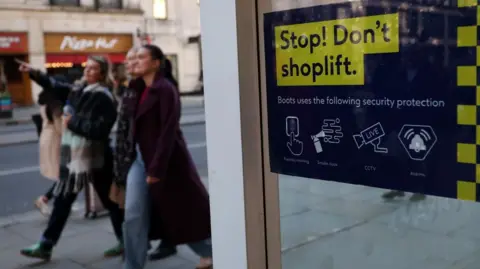**Shoplifting Reaches Record Levels in England and Wales**
In a concerning trend affecting the retail sector, shoplifting incidents have surged to unprecedented levels in England and Wales. A recent report from the Office for National Statistics (ONS) has highlighted that the number of reported shoplifting offences hit a staggering 530,643 for the year ending in March 2025. This figure represents a dramatic 20% increase compared to the previous year, marking the highest rate of theft recorded since data collection began over 20 years ago.
Retailers across these regions express deepening alarm over this rise in criminal activity. According to the ONS, there has been a discernible uptick in shoplifting incidents since the pandemic, leading to concerns that organized crime networks are becoming increasingly brazen. Gangs are reportedly targeting multiple stores in quick succession, effectively disrupting the retail landscape and instilling fear among staff and shoppers alike.
The British Retailers Association (BRC) director, Tom Ironside, has openly criticized the situation, underscoring the dangerous implications of retail theft. He articulates that theft is far from a “victimless crime,” as it catalyzes violence against store staff and imposes significant financial burdens on both retailers and customers—amounting to an estimated loss of £2.2 billion annually. Furthermore, Ironside emphasizes the trend of organized crime, stating that these gang-related thefts are rapidly complicating the landscape for retail businesses trying to maintain security and customer service standards.
In addition to the official statistics released by the ONS, the Association of Convenience Stores (ACS) has provided additional insights into the growing problem. Led by chief executive James Lowman, the ACS reported over 6.2 million shoplifting incidents within convenience stores alone over the past year. Lowman pointed to a notable decline in crime reporting among retailers, who express skepticism regarding effective investigations by authorities. He argues that retail crime must be prioritized throughout the justice system in order for retailers to regain confidence in reporting incidents, which currently undermines efforts to combat the pervasive issue of shoplifting.
To address the rampant shoplifting problem, the UK government introduced the Crime and Policing Bill, led by Home Secretary Yvette Cooper. This legislation aims to tackle the “epidemic of street theft,” which encompasses shoplifting and other forms of quick, opportunistic theft. One significant element of the bill seeks to modify existing legal thresholds for shoplifting, where current laws treat theft of goods valued under £200 as summary-only offences, often de-emphasized by law enforcement. Ironside advocates for removing this threshold, arguing that it would send a strong message that all instances of theft will not be tolerated, regardless of their monetary value.
In response to these alarming ONS figures, Yvette Cooper reassured the public that the government is committed to enhancing local policing efforts. Anticipated measures include deploying extra patrols to more than 500 town centers and increasing the number of neighbourhood officers and police support personnel by an additional 3,000 by the following spring. This proactive approach is essential for maintaining public safety and restoring confidence in retail environments.
Overall, the alarming spike in shoplifting cases not only poses a significant economic challenge for retailers but also impacts customer experiences and affects the safety of staff members. Urgent reforms and increased policing efforts will be crucial steps to combat the rising tide of theft that threatens the retail landscape in England and Wales.












